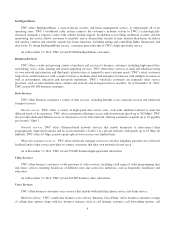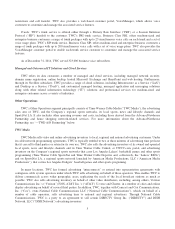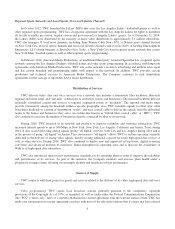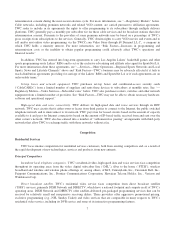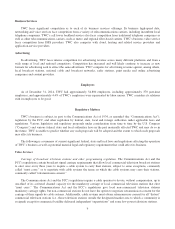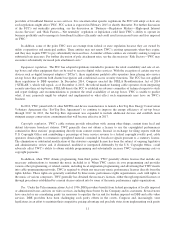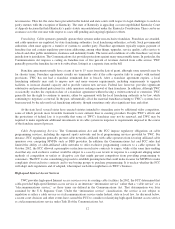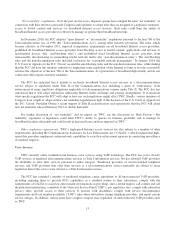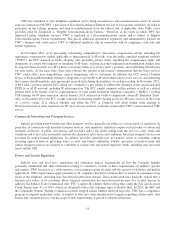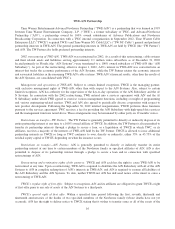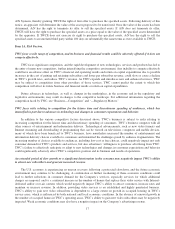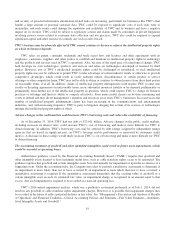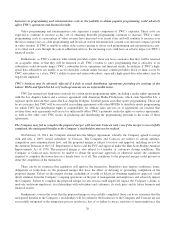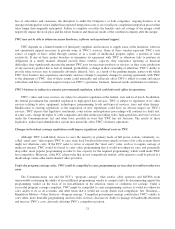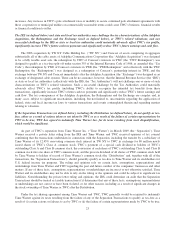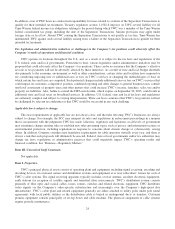Time Warner Cable 2014 Annual Report Download - page 22
Download and view the complete annual report
Please find page 22 of the 2014 Time Warner Cable annual report below. You can navigate through the pages in the report by either clicking on the pages listed below, or by using the keyword search tool below to find specific information within the annual report.TWC has submitted to state telephone regulation and to being classified as a telecommunications carrier in certain
states in connection with TWC’s provision of discounted Lifeline telephone services to low-income customers. In order to
participate in the Lifeline program and receive reimbursement from the federal and, if applicable, state USFs, voice
providers must be designated as “Eligible Telecommunications Carriers.” Therefore, in the states in which TWC has
deployed Lifeline telephone services, TWC is regulated as a telecommunications carrier and is subject to Eligible
Telecommunications Carrier requirements. This places additional operational, regulatory and administrative burdens on
TWC’s business and could expose TWC to additional regulatory risk in connection with its compliance with state and
federal regulation.
In November 2011, in its proceeding considering comprehensive intercarrier compensation reform, including the
appropriate compensation regime applicable to interconnected VoIP traffic over the public switched telephone network
(“PSTN”), the FCC released an Order adopting rules providing greater clarity regarding the compensation rights and
obligations of carriers that originate or terminate VoIP traffic, making clear that origination and termination charges may
be imposed when an entity uses IP facilities to transmit traffic to or from a party’s premises and establishing default rates
for such traffic. At the same time, these rules reduced the amount of intercarrier compensation that providers such as
TWC could collect from long-distance carriers terminating calls to customers. In addition, the FCC issued a Further
Notice of Proposed Rulemaking seeking to adopt rules to govern IP-to-IP interconnection for voice services and indicating
that carriers should negotiate such agreements in good faith during the pendency of such proceeding. In November 2012,
AT&T filed a petition with the FCC asking it to commence a proceeding to address the transition of the circuit-switched
PSTN to an all IP network, including IP interconnection. The FCC sought comment on this petition as well as a related
petition filed in November 2012 by representatives of some small incumbent telephone companies (“RLECs”) seeking
USF funding for IP interconnection, and in January 2014, released an Order to implement certain IP Transition Trials.
Also, in November 2014, the FCC sought comment on ensuring reliable backup power for IP voice services in the event
of a power outage. It is unclear whether and when the FCC or Congress will adopt further rules relating to
IP interconnection or other regulation for IP voice services and how such rules would affect TWC’s interconnected VoIP
service.
Commercial Networking and Transport Services
Entities providing point-to-point and other transport services generally are subject to various kinds of regulation. In
particular, in connection with intrastate transport services, state regulatory authorities require such providers to obtain and
maintain certificates of public convenience and necessity and to file tariffs setting forth the service’s rates, terms and
conditions and to have just, reasonable and non-discriminatory rates, terms and conditions. Interstate transport services are
governed by similar federal regulations. In addition, providers generally may not transfer assets or ownership without
receiving approval from or providing notice to state and federal authorities. Finally, providers of point-to-point and
similar transport services are required to contribute to various state and federal regulatory funds, including state universal
funds and the USF.
Privacy and Security Regulation
Federal, state and local laws, regulations and ordinances impose requirements on how the Company handles
personally identifiable and other information relating to consumers. Certain of these requirements are industry specific
and regulate TWC because it is a cable operator, a telecommunications provider and the operator of websites and mobile
applications. Other requirements apply generally to all companies that hold consumer data or market to consumers using
email or the telephone, including state data breach notification statutes. These notification laws generally require that a
business give notice to its customers whose financial information has been disclosed because of a security breach. In
addition, the Federal Trade Commission (the “FTC”) applies the identity theft red flag rules under the Fair and Accurate
Credit Transactions Act of 2003, which are designed to detect the warnings signs of identity theft. In 2013, the SEC and
the Commodity Futures Trading Commission jointly adopted similar identity theft red flag rules. TWC has a compliance
program as required under these rules. A number of bills have been introduced in Congress regarding cybersecurity, data
breach and consumer privacy, but the scope of such requirements, if passed, is unclear at this time.
14


